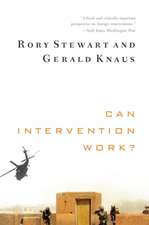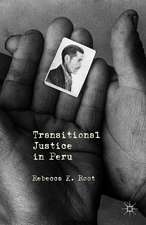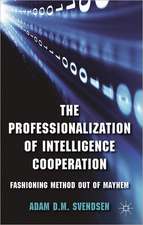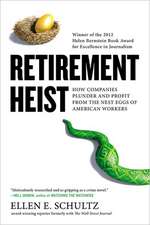World Politics: International Relations and Globalisation in the 21st Century
Autor Jeffrey Haynes, Peter Hough, Shahin Malik, Lloyd Pettiforden Limba Engleză Paperback – 10 dec 2010
Written specifically for students who are approaching this subject for the first time, World Politics is the most accessible, coherent and up-to-date account of the field available. It covers the historical backdrop to today’s political situations, the complex interactions of states and non-state actors, the role of political economy, human security in all its forms, and the ways in which culture, religion and identity influence events.
World Politics takes a new approach that challenges traditional interpretations, and will equip students with the knowledge and the confidence needed to tackle the big issues.
| Toate formatele și edițiile | Preț | Express |
|---|---|---|
| Paperback (1) | 460.56 lei 6-8 săpt. | |
| Taylor & Francis – 10 dec 2010 | 460.56 lei 6-8 săpt. | |
| Hardback (1) | 1272.54 lei 6-8 săpt. | |
| Taylor & Francis – oct 2015 | 1272.54 lei 6-8 săpt. |
Preț: 460.56 lei
Preț vechi: 541.83 lei
-15% Nou
Puncte Express: 691
Preț estimativ în valută:
88.13€ • 94.24$ • 73.48£
88.13€ • 94.24$ • 73.48£
Carte tipărită la comandă
Livrare economică 17 aprilie-01 mai
Preluare comenzi: 021 569.72.76
Specificații
ISBN-13: 9781408204924
ISBN-10: 1408204924
Pagini: 832
Dimensiuni: 189 x 246 x 33 mm
Greutate: 1.38 kg
Ediția:1
Editura: Taylor & Francis
Colecția Routledge
Locul publicării:Oxford, United Kingdom
ISBN-10: 1408204924
Pagini: 832
Dimensiuni: 189 x 246 x 33 mm
Greutate: 1.38 kg
Ediția:1
Editura: Taylor & Francis
Colecția Routledge
Locul publicării:Oxford, United Kingdom
Cuprins
Part One: International Relations and Globalisation
1. International Relations and Globalisation in the 21st Century
International Relations and globalisation
Why is globalisation important for understanding International Relations?
Technological, political, economic and cultural globalisation
Important post-Cold War changes affecting International Relations
Understanding globalisation
Conclusion
2. International Order, International Society and Globalisation
Fundamental aspects of International Relations following the Peace of Westphalia (1648)
International order and international society after the cold War
Globalisation, international order and international society
Conclusion
Part Two: The History of Globalisation and International Relations
3. International Relations from the early 19th Century to World War II
European nationalism and imperialism
World War I and International Relations
The League of Nations: an attempt to build an international organisation to maintain collective security
The legacy of the League of Nations
Conclusion
4. International Relations after World War II
International relations after World War II
The United Nations
The Cold War and nuclear weapons
The international relations of the developing countries
Conclusion
5. After the Cold War: International Relations in a Globalised World
Introduction
International relations after the Cold War: the impact of globalisation
New World Order: more cooperation, less conflict?
Competing norms and values in international relations after the Cold War
Trends in post-Cold War international relations: security, ideology and development
International Relations in the 21st century
Conclusions
Part Three: International Relations Theories
6. Realism and Neo-Realism
Context
The ‘back-story’ to Realism
Realism in International Relations
Key assumptions
Key concepts
Conclusions and criticisms
7. Liberalism
Context
The ‘back-story’ to Liberalism
Liberalism in contemporary International Relations
Key assumptions
Key concepts
Conclusions and criticisms
8. Marxism and Neo-Marxism
Context
The ideas of Marx
The ideas of Lenin
Dependency Theory
World Systems Theory
Key concepts
Conclusions and criticisms
9. Critical Theory
Context
Contemporary critical theory and IR
Key concepts
Conclusions
10. Alternative Approaches
Theoretical context
Postmodernism
Feminism
Green theory
Conclusions
11. Social Constructivism
Social Constructivism as a bridge between the traditional theories
Agency and culture in IR
A Social Constructivist reappraisal of IR’s key concepts
The empiricists strike back? Critiques of Social Constructivism
Conclusion
Part Four: International and Regional Actors
12. Intergovernmental Organisations
What is an intergovernmental organisation?
The evolution and diversity of IGOs
IR theory and IGOs
Conclusions
13. Global Multi-Purpose IGOs: The United Nations and the Organisation of the Islamic Conference
Intergovernmental organisations and globalisation
The United Nations and international law
The UN Charter
The five permanent members of the UN Security Council: permanent privileges
Organisation of the Islamic Conference (OIC)
The OIC: history and development
Conclusion: comparing the UN and the OIC
14. Regional Organisations and Regionalisation: Theory and Practice
Introduction
Regional cooperation and globalisation
Old regionalisation and new regionalisation
The North American Free Trade Agreement
Asia Pacific Economic Cooperation
Conclusion
15. The European Union and the African Union
Introduction
The European Union
The African Union
Conclusion
Part Five: Current Global Issues
16. International Political Economy, Part I: Theory and History
What is IPE?
A short history of IPE
Approaches to IPE
The contemporary trading system
The contemporary international monetary system
Conclusions
17. International Political Economy, Part II: Key Actors and Controversies
The IMF and World Bank
International trade organisations
Multi-national corporations (MNCs)
Theoretical perspectives on the actors of IPE
Conclusions
18. Development, Poverty and Inequality
The persistence of global poverty
Approaches to development
The evolution of development policy
Conclusions
19. Gender
Context
Gender approaches to IR
Gender and security
Gender and international development
Future developments
Conclusions
20. Identity and Identities
Forms of identity
Theorising identity
Conclusions
21. Democratisation
What is democracy?
The three waves of democratisation
What can make democracy permanent?
Democratisation by force – ‘nation building’
Is democratisation important for international relations?
Conclusions
22. Human Rights
The evolution of the idea of human rights
The United Nations and the codification of human rights
Implementing human rights
Are human rights ‘right’?
Conclusions
23. The Natural Environment
The emergence of political ecology
The globalisation of political ecology
Global environmental policy and human security
Threats to a global consensus on environmental policy
Conclusions
1. International Relations and Globalisation in the 21st Century
International Relations and globalisation
Why is globalisation important for understanding International Relations?
Technological, political, economic and cultural globalisation
Important post-Cold War changes affecting International Relations
Understanding globalisation
Conclusion
2. International Order, International Society and Globalisation
Fundamental aspects of International Relations following the Peace of Westphalia (1648)
International order and international society after the cold War
Globalisation, international order and international society
Conclusion
Part Two: The History of Globalisation and International Relations
3. International Relations from the early 19th Century to World War II
European nationalism and imperialism
World War I and International Relations
The League of Nations: an attempt to build an international organisation to maintain collective security
The legacy of the League of Nations
Conclusion
4. International Relations after World War II
International relations after World War II
The United Nations
The Cold War and nuclear weapons
The international relations of the developing countries
Conclusion
5. After the Cold War: International Relations in a Globalised World
Introduction
International relations after the Cold War: the impact of globalisation
New World Order: more cooperation, less conflict?
Competing norms and values in international relations after the Cold War
Trends in post-Cold War international relations: security, ideology and development
International Relations in the 21st century
Conclusions
Part Three: International Relations Theories
6. Realism and Neo-Realism
Context
The ‘back-story’ to Realism
Realism in International Relations
Key assumptions
Key concepts
Conclusions and criticisms
7. Liberalism
Context
The ‘back-story’ to Liberalism
Liberalism in contemporary International Relations
Key assumptions
Key concepts
Conclusions and criticisms
8. Marxism and Neo-Marxism
Context
The ideas of Marx
The ideas of Lenin
Dependency Theory
World Systems Theory
Key concepts
Conclusions and criticisms
9. Critical Theory
Context
Contemporary critical theory and IR
Key concepts
Conclusions
10. Alternative Approaches
Theoretical context
Postmodernism
Feminism
Green theory
Conclusions
11. Social Constructivism
Social Constructivism as a bridge between the traditional theories
Agency and culture in IR
A Social Constructivist reappraisal of IR’s key concepts
The empiricists strike back? Critiques of Social Constructivism
Conclusion
Part Four: International and Regional Actors
12. Intergovernmental Organisations
What is an intergovernmental organisation?
The evolution and diversity of IGOs
IR theory and IGOs
Conclusions
13. Global Multi-Purpose IGOs: The United Nations and the Organisation of the Islamic Conference
Intergovernmental organisations and globalisation
The United Nations and international law
The UN Charter
The five permanent members of the UN Security Council: permanent privileges
Organisation of the Islamic Conference (OIC)
The OIC: history and development
Conclusion: comparing the UN and the OIC
14. Regional Organisations and Regionalisation: Theory and Practice
Introduction
Regional cooperation and globalisation
Old regionalisation and new regionalisation
The North American Free Trade Agreement
Asia Pacific Economic Cooperation
Conclusion
15. The European Union and the African Union
Introduction
The European Union
The African Union
Conclusion
Part Five: Current Global Issues
16. International Political Economy, Part I: Theory and History
What is IPE?
A short history of IPE
Approaches to IPE
The contemporary trading system
The contemporary international monetary system
Conclusions
17. International Political Economy, Part II: Key Actors and Controversies
The IMF and World Bank
International trade organisations
Multi-national corporations (MNCs)
Theoretical perspectives on the actors of IPE
Conclusions
18. Development, Poverty and Inequality
The persistence of global poverty
Approaches to development
The evolution of development policy
Conclusions
19. Gender
Context
Gender approaches to IR
Gender and security
Gender and international development
Future developments
Conclusions
20. Identity and Identities
Forms of identity
Theorising identity
Conclusions
21. Democratisation
What is democracy?
The three waves of democratisation
What can make democracy permanent?
Democratisation by force – ‘nation building’
Is democratisation important for international relations?
Conclusions
22. Human Rights
The evolution of the idea of human rights
The United Nations and the codification of human rights
Implementing human rights
Are human rights ‘right’?
Conclusions
23. The Natural Environment
The emergence of political ecology
The globalisation of political ecology
Global environmental policy and human security
Threats to a global consensus on environmental policy
Conclusions
Notă biografică
Jeffrey Haynes, Peter Hough, Shahin Malik, Lloyd Pettiford
Descriere
From the war on terror to the global financial crisis, traditional concepts of world politics are being challenged on a daily basis. In these uncertain times, the study of international relations and the forces that shape them have never been more important.
Written specifically for students who are approaching this subject for the first time, World Politics is the most accessible, coherent and up-to-date account of the field available. It covers the historical backdrop to today’s political situations, the complex interactions of states and non-state actors, the role of political economy, human security in all its forms, and the ways in which culture, religion and identity influence events.
World Politics takes a new approach that challenges traditional interpretations, and will equip students with the knowledge and the confidence needed to tackle the big issues.
Written specifically for students who are approaching this subject for the first time, World Politics is the most accessible, coherent and up-to-date account of the field available. It covers the historical backdrop to today’s political situations, the complex interactions of states and non-state actors, the role of political economy, human security in all its forms, and the ways in which culture, religion and identity influence events.
World Politics takes a new approach that challenges traditional interpretations, and will equip students with the knowledge and the confidence needed to tackle the big issues.


















